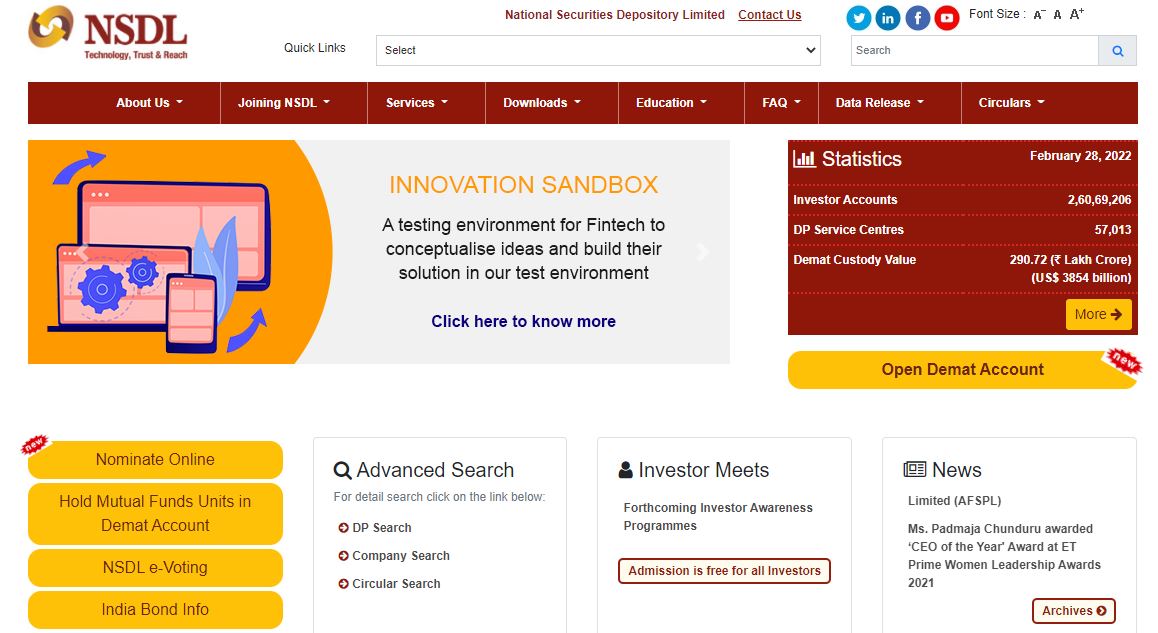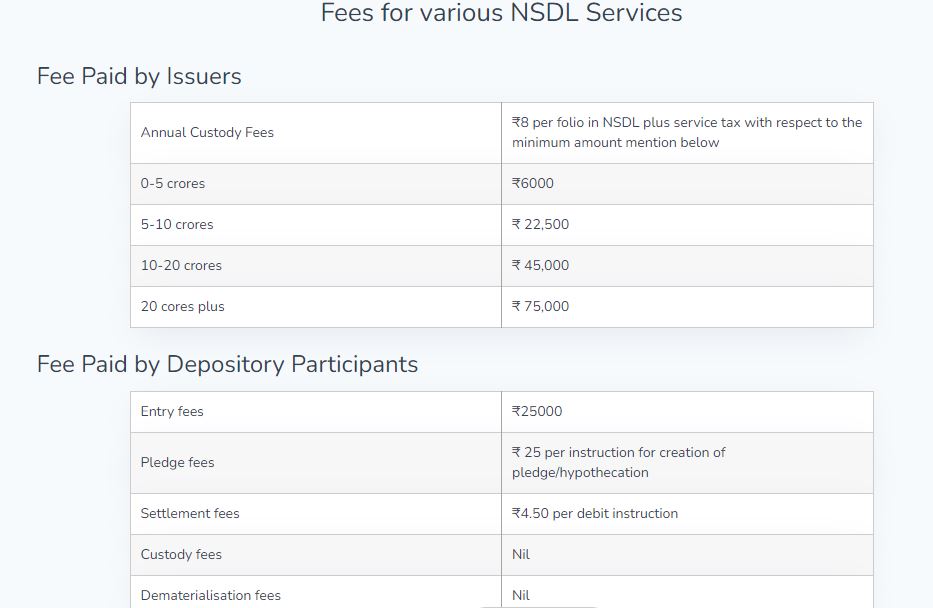Want to know what is nsdl? Well you have landed on the right article!
We all make deposits in banks and reap benefits. Banks are in charge of these perks. Similarly, trade has moved from physically purchasing certificates to swapping them online with a single click.
Today, most of the world engages in trading and reaps the rewards. Depositories also keep an eye on the market's enthusiasm and addiction. We are well-versed in the notion of trading securities as investors.
These assets are kept safe in a specific location. 'Depository' is the name given to this location. A bank or a Demat account can serve as a repository. Central Depository Services Limited (CDSL) and National Securities Depository Limited (NSDL) are the two basic types of depositories.
What is NSDL?
NSDL full form: National Securities Depository Limited founded in 1996 and is India's oldest depository institution. It was the nation's first electronic securities depository, and it stores electronic shares, bonds, and other securities.
Previously, items were only available in print format. The handling of NSDL's securities has become reasonably simple and painless now that they are held electronically.
NSDL is comparable to a bank. The distinction is that NSDL possesses securities, while banks have depositors' money. The Industrial Development Bank of India (IDBI), The National Stock Exchange (NSE), and the Unit Trust of India (UTI) all support NSDL.
In the same way that a bank provides a variety of services to its customers and accepts deposits, NSDL India offers a variety of share-related services.
Functions of NSDL and what is NSDL account?
Now that you've learned what the National Securities Depository Limited is, it's time to learn more about how it operates. Simply defined, the NSDL enables investors and traders to open an account to hold their shares and assets online.
It's similar to a bank, where consumers can open accounts to keep their money safe, except in the instance of the NSDL, where the account holds dematerialized or digital forms of shares and securities rather than cash.
The NSDL accepts accounts from various market players, including banks, brokers, purchasers, and any other company that issues securities. However, you cannot contact a depository straight to set up an account, such as nsdl depository.
You must instead open an account with a Depository Participant (DP). DPS are intermediaries who connect depositories, such as the National Securities Depository Limited, with traders and other account holders.

What is a Demat Account with NSDL?
An account with NSDL is referred to as an NSDL Demat account. You must visit an NSDL-registered DP to open an NSDL Demat account.
The participants' list can be seen on the institution's website. It's worth noting that stockbroking firms double as DPS, and you can ask any stockbroking firm if they are registered with NSDL.
If such is the case, you can use that DP to open an NSDL Demat account. It is straightforward to open an NSDL Demat account. After you've found an NSDL-registered DP, you'll need to:
- Complete the Know Your Customer (KYC) criteria, which include completing the application form, as well as your PAN card, verification of address, and bank account information.
- The DP will open the account for you once the paperwork has been verified.
- After the account is created, the DP will provide you with all account information, including your client ID, DP ID, tariff sheet, and so on. You'll also receive your login credentials for accessing your account.
Advantages of NSDL:-

No More Bad Deliveries: Every client in the Indian Financial Market must face significant risks by entering into a trade without getting approval of the value of the purchased assets.
When you use a depository platform, you won't have to deal with this issue. There's no way you will be stuck in an 'under objection' situation with NSDL.Stamp duty: While it was required in the previous approach, stamp duty is no longer required when securities are exchanged through depositories. This law applies to transfers of equity shares, mutual funds, and debt instruments.
Replacement of Paper Certificates: In the past, employing paper certificates to deal with stocks resulted in a slew of issues. It exposes certificates to the risk of being stolen, damaged, or mutilated due to atmospheric and meteorological conditions.
However, with the assistance of depository systems, digital solutions are becoming increasingly popular.Instant transfer and registration of shares: In a depository system, once security is credited to a shareholder's account, that client becomes the rightful owner of that investment.
It is in high contrast to the physical system when they had to mail them to the company registration to change ownership, which took a long time. It also subjected the investor to the danger of being lost in route and the opportunity cost of a transfer delay.Brokerage: Brokerage costs get reduced since securities are transferred through depositories, which reduces backend paperwork, broker labor, and the danger of becoming an introducer.
As an outcome, brokers' brokerage fees are also decreased. It benefits both brokers and investors, making it a win scenario for everyone.Ease of updating investor information: In the past, if an investor's information changed, such as his communication address, he must go through the time-consuming procedure of updating it in each company where he had invested.
This procedure has been streamlined, as the investor now only needs to notify his Depository Participants (DPs) and provide the necessary documentation. There is no requirement to inform each organization separately because the data is updated instantly everywhere.Periodic Status Reports are Easy to Maintain: With the support of a depository system, it is pretty convenient for traders to keep track of all transactions and the purchase or sale of shares regularly.
It will assist investors in gaining a better grasp of the processes and modifications that must be made for them to have a lucrative future.Rapid Disbursements of Non-Cash Corporate Efficiency: One of the critical benefits of the NSDL system is that it allows stakeholders to invest in non-monetary corporate incentive transfers quickly.
The possibility of paper-based certifications being lost is eliminated because the entire process takes place over social media. Securities were transferred in a secure, timely, and transparent manner.Streamline the process for selling securities maintained on behalf of minors: The custodian who has been appointed as the minor's primary caregiver does not need to seek court approval before selling securities kept in Demat account on the minor's behalf.
Faster resolution and greater liquidity: NSDL settles on the second working day following the trading day, i.e., T+2 rolling settlement. As a result, the transaction cycle is quicker, and client liquidity increases.
Services offered by NSDL
Basic Service:
Brokers, banks, investors, and other entities that issue securities and engage in the Indian financial market are among the essential services provided by NSDL.
A client must first open a depository account with DPs to use these services. The three types of depository accounts are beneficiary accounts, clearing member accounts, and intermediary accounts.Value-Added Services
- SMS Notifications: For all Demat account holders, NSDL provides free SMS notifications for all operations, alerts, and notifications.
- Public Issue: The Securities and Exchange Board of India has issued a statement stating that all public share trades will be held exclusively in Demat form.
- Dividend Distribution: As a kind of corporate financial advantage, dividend distribution is exclusively distributed to shareholders in the form of dividends.
- Lending and Borrowing: This only applies to intermediaries who have been approved and authorized by SEBI under the Securities Lending Scheme of 1997.
- In addition, the intermediate must be approved by NSDL.
- Automatic Delivery out Instructions: If you need to regularly transfer your stocks from a CM Pool Account to a CM Delivery Account, you'll require a set of instructions.
- The clearing corporation must approve such orders on your behalf.
- This makes it easier for the clearing corporation to handle all of your auto-transactions.
NSDL CAS (Consolidated Account Statement)
This single statement contains information on all of your security market holdings. It includes data on stock investments, mutual funds, securities and debentures, government bonds and certificates, and money market funds such as Treasury bills.
This statement also allows the buyer to examine their entire portfolio electronically.
Conclusion:
India's capital market, which has been around for nearly a century, has always been a hive of activity. However, because of the paper-based settlements, there were various difficulties, such as poor distribution, a delayed transition, etc.
The Depositories Act of 1996 established Security Depositories in India to manage securities. The National Securities Depository Limited (NSDL) is India's first and largest depository.
It was founded on November 8, 1996, and its primary aim is to handle securities of the Indian capital market in a dematerialized form, which it has done admirably for decades.
I hope you liked our article on what is nsdl, if you have any comments or suggestions do share them in the comments below.
Frequently Asked Questions
1. Is NSDL safe?
NSDL is one of India's two government-approved depositories. The Depositories Act of 1996 governs it. The National Securities Depository Limited (NSDL) is a secure, dependable, and well-regulated depository.
For online trading and investments, and NSDL Demat account is safe and convenient.
2. Is it true that all of the DPs are the same?
The NSDL has established some basic eligibility requirements for becoming a DP. In some ways, the requirements are comparable to the corresponding provisions of SEBI regulations, if not identical.
All DPS are the same in that NSDL hires them only after receiving a Certificate of Registration from SEBI. However, DPs may offer different types of services, have different service standards, and charge different rates for the services they provide.
3. What is in-person verification, and how does it work?
According to SEBI norms, establishing the applicant's identification at account establishment is required.
4. Is it possible to run a joint account on a "either or survivor" basis, similar to a bank account?
According to current rules, a Demat account cannot be handled on a "either or survivor" basis, unlike a bank account. As a result, all joint holders must sign every instruction for a jointly held Demat account.

